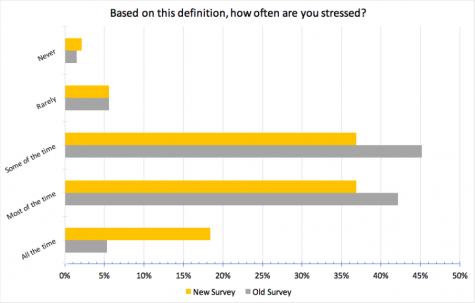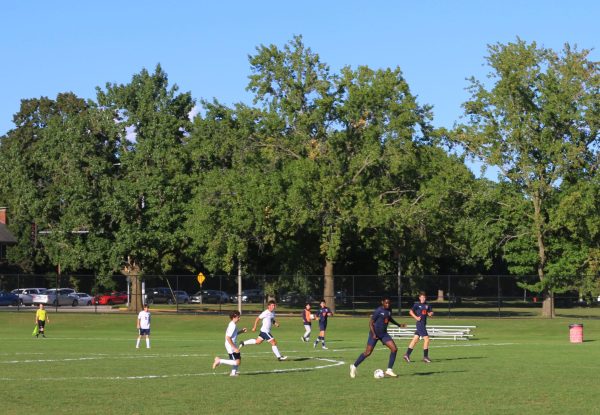Future of stress at Uni

It’s a common sight: students line the hallway, with their heads on the hard floor, sleeping anywhere they can. It’s been an intense night for all of them, studying, writing, and working on homework. Students are stressed so often that it has become normalized.
In 2013, an article was published in The Gargoyle called “Stressed and Obsessed”. It focused on student stress at Uni and where it came from. A survey was conducted, and this year we repeated the survey to see if anything has changed. In 2013, 75% of students cited homework and 83% cited tests as the reason for their stress. This year, 88% of students cited homework as a reason for their stress, and 84% said tests. This makes these two categories the most consistently prevalent stressors.
After “Stressed and Obsessed” was published, the “30-minute homework rule” was added to the Student Handbook. According to our survey, students interpreted that the 30-minute homework rule means that no more than 30 minutes of homework can be assigned each night under any circumstances. However, teachers Dave Stone and Ben Leff state that the 30-minute homework rule means that over a period of time the average amount of time throughout those days should be 30 minutes a day, and includes projects and tests as well.
Senior Ema Rajic says that, “We don’t have a lot of daily homework, but more long term projects and essays,” making the rule is difficult to interpret because people can spend a varying amount of time on projects and studying for tests.
While students can spend a varying time on studying and projects, a responsibility still falls to teachers to make sure that students are not overwhelmed. However, teachers struggle with is figuring out how to find a balance of assigning homework. “I think that one thing that we as teachers struggle with as that we see the value of them not just not doing stuff in class; we want them to do stuff outside of class that prepares them for class or applied what’s in class. The challenge is to do that in a way that is manageable and reasonable for the kids,” said Leff.
Leff has stated that there are certain things he has done as a teacher to combat students feeling overwhelmed in his classroom. He thinks about about how much homework students already have, how long it takes students to do the assignment,
Stone said that it’s fairly easy for teachers to tell when they’re assigning too much homework. “If you’re reasonably perceptive as a teacher, you should be able to figure out if you’re assigning more homework than people can process or can deal with. They’ll look terrible and their motivation will not be good.”
Stone said that since the 2013 article and the institution of the homework policy, teachers have decreased the amount of homework they give. On the other hand, Rajic said that the level of stress has not changed at Uni in recent years.
One reason that may account for why students continue to feel stressed is that they fill what time they have with extracurricular activities, according to Stone. Leff agrees that students have gotten busier outside of school since he graduated from Uni in 2001.
Uni advertises itself as an “academically rigorous” school, admitting students who are dedicated to academics and do their homework. As a result, both students and teachers agree that Uni’s environment is an underlying factor in student stress. In both the 2013 and recent survey, students predominantly answered that they put the most pressure on themselves.
“Being at Uni has cultivated something in me to be perfect all the time,” says Rajic. She agreed that much of her motivation to do well came from herself, but being surrounded by similarly driven people also contributed to this mindset.
Whether or not this is just a part of Uni culture, there are consequences to excessive student stress. Just before “Stressed and Obsessed” was published four years ago, the faculty gathered to watch the film Race to Nowhere, which takes a look at how students are overwhelmed in the educational system due to over-scheduling, standardized tests, and the perfectionist mindset.
Uni students can attest to this; 82% of students responded that stress negatively affects their sleep schedule. This might be expected, but almost half of students said that it also negatively affects their eating habits, social relationships, and extracurricular activities. 46% of students reported feeling depressed, and 25% said they have anxiety or panic attacks.
Stress affects many students academic abilities. Nearly half of students say that they feel like they are not doing as well as they could and don’t enjoy learning as much. For many, the stress they experience is no longer normal.
However, stress is not an entirely bad thing. Sophomore Angelynn Huang said that “Stress motivates you to do work, to take charge of your own education,”. Rajic agrees that it is just a part of going to Uni and prepares you well for college.
The fact that Uni students end up being more stressed about academics is not a new idea. However, Leff says “That can’t be a cop-out [for teachers] to say “My hands are clean, it’s on them so they need to deal with it.’ I think there are things we can do to try to facilitate an environment that’s healthier,”.
Uni is known for its culture of stress, whether it be because of the motivated students it attracts or the academically rigorous curriculum. Stress is so ingrained in the life of a Uni student that it seems impossible to get out of that mindset. Sophomore Jenna Lee commented, “Stress is glorified at Uni.” It has been normalized and accepted as part of being at Uni.
While the stress students face may be merely “part of the culture”, there is a responsible way to give homework and projects to students. Rajic and Huang both agreed that teachers should make an effort to talk to each other. Perhaps the notoriously underused “test and project calendar” could be utilized to reduce at least a portion of student stress. Stone agrees, saying “It’s a continual thing, balancing what the other teachers are doing and trying to make things reasonable for you guys.”
“Grades don’t define you. Education is just a base for things you will do later in life,” said Huang, discussing the obsession with grades. She suggested that students and teacher can make an effort to put less emphasis on grades. While things at Uni are difficult to change, there are teachers who are already implementing this mindset in the classroom. For example, Leff said that he makes a big point of not sharing grades on tests, as it creates an environment where everyone feels pressure to share their grades.
At the Student-Faculty Advisory Committee meeting on Tuesday November 7, ideas about ways to reduce student stress were brought up. Students suggested that the schedule could be changed by making class periods longer or the school day to start later. This would allow students to be more engaged in class and possibly focus less on grades. This will most likely be a continued topic of discussion at Student Council meetings, in the classroom, and for years to come at Uni.


Annette Lee • Nov 14, 2017 at 11:29 pm
This was a really interesting article! I especially like how you compared the survey results to those from 2013. I’m one of the people who believe that one of the biggest things teachers could do is actually use the test & project calendar. I’ve heard teachers openly say that they don’t bother with it. It’s pretty frustrating.